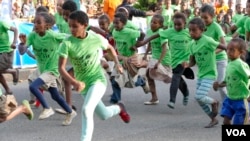A new report finds that children across East and Southern Africa suffer huge amounts of abuse. UNICEF says this epidemic of violence hurts more than just the children - it hurts society.
Researchers say they have found a “staggering incidence” of violence against children in East and Southern Africa.
The numbers, indeed, are hard to swallow. The new study, released Tuesday, found that that two in five girls under 18 have endured sexual abuse and that more than seven in 10 children have reported severe beatings at home or school. In Tanzania, for example, kids said those beatings included being kicked or punched.
The study is a collaboration between many agencies including the Africa Child Policy Forum, Save the Children, and the United Nations Children's Fund.
James Elder, regional head of communications for UNICEF in Eastern and Southern Africa, says research is still being done on what causes these countries to have a disproportionately high rate of child abuse - though he notes that child abuse is a worldwide phenomenon that transcends culture and nationality.
He says possible causes include social stresses, pervasive violence in society, instability, and poverty and that the solution is equally complex.
“It really does involve everyone from families, mums and dads, to government. … So we’re talking about parents and children being equipped with life skills, having an understanding about how to deal with conflict resolution, how to deal with frustrations in ways that don’t involve hitting children," he said. "We’re talking about changing attitudes in the way children are seen, giving children a higher standing in society, which obviously is a long-term strategy, but it’s very important."
The scars of abuse linger well beyond childhood, he says. And they hurt everyone.
“Research shows that children who constantly have violence at home do worse at school, potentially have less earning impact," Elder said. "So that parent who brought that child into the world therefore has a responsibility."
And, he says, parents should think of themselves as well. Africa’s population is growing in leaps and bounds and is significantly younger than any other continent.
And so, he says, caring properly for children isn’t purely for children’s sake - one day, these children may be the ones caring for their aging parents.
